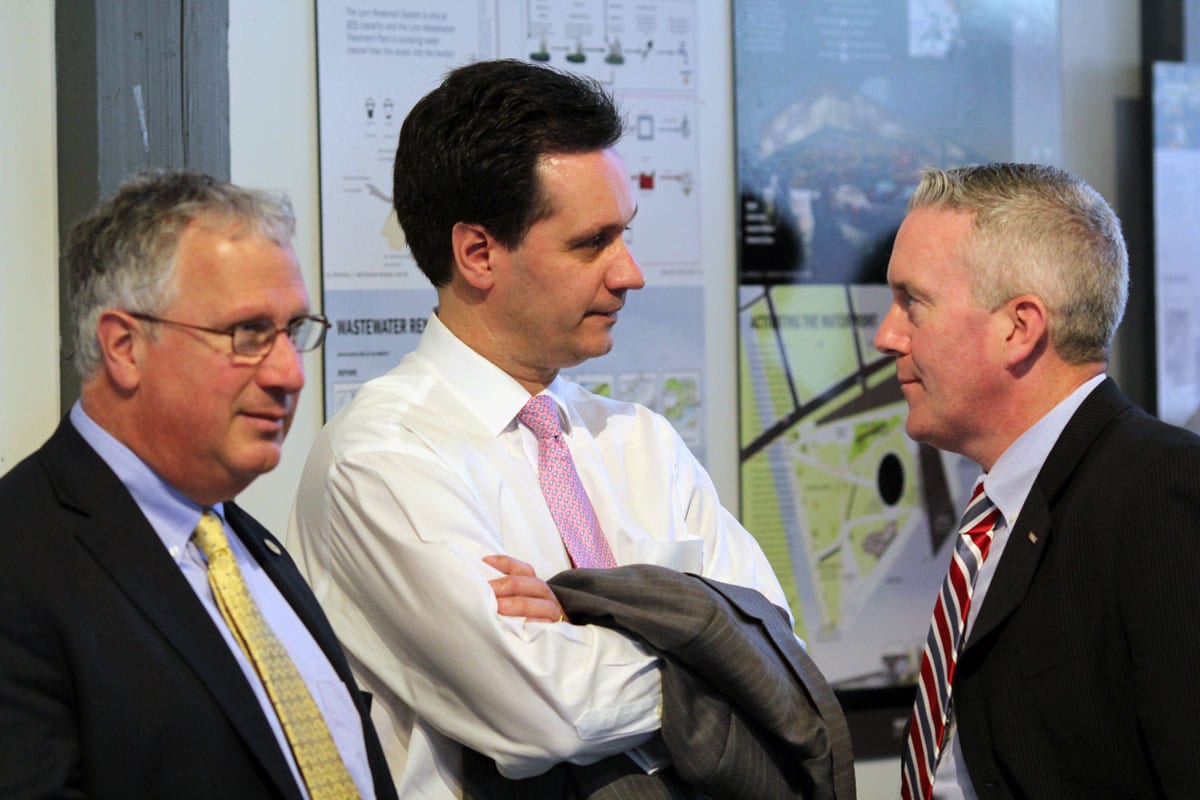ITEM PHOTO BY OWEN O’ROURKE
Ideas about transportation are shared at a public forum in Lynn.
LYNN — Input from North Shore residents at a public forum on Tuesday at the Lynn Museum will help legislators and MassMoves create a statewide transportation vision.
As part of the state Senate’s 2017 Commonwealth Conversations, MassMoves, funded by the Barr Foundation, is facilitating nine public workshops across the state. Lynn was the eighth forum, according to a description of the event. MassMoves is an initiative to engage citizens across the state about their ideas for a 21st century transportation system.
Participants in the workshop were asked to weigh in on potential goals of a 21st century transportation, polling on their importance. Some of the goals were: It should be easier and faster to get around, whether by car, public transportation, walking or biking; transportation should be cleaner, producing far fewer greenhouse gases and other types of pollution than it does today; the transportation network should be resilient, meaning it can bounce back from severe weather; and transportation should use the latest technology to manage traffic and provide real-time information to help residents plan their trips.
“What we do, each event during lunchtime, is what we call MassMoves transportation event, where we talk to people about the current state of transportation in Massachusetts and in their region and then we have workshops where we invite people to tell us what they think about the policy issues and the values that they have,” said Jim Aloisi, former secretary of transportation and a consultant with MassMoves.
“What we hope will happen at the end of this is that there will be a report that will say here’s what we found across the state,” he continued. “What we’re hoping will come out of this is a way to inform the legislature to say here’s how you can advance improving transportation, based on the shared values people have and make those connections.”
Aloisi said preliminary poll data from the previous forums has showed that people have the same values in wanting to focus more on public transportation and a cleaner system. He said decision makers can know the information and then may be able to use that data when they decide to make changes or adopt new policies.
Sen. Thomas McGee (D-Lynn) said the forums are important for people to see the broader issues faced in transportation and have a wide range of discussion.
“I think what’s really important is getting the input from the people that came here that were interested enough in transportation to be at the forum at lunch and get their point of view and what they see as important, so it’s going to allow us to shape policy decisions we make, as we look towards creating legislation and a comprehensive plan to address transportation, both this region and around the state,” McGee said.
“When this is completed, we’ll have a complete report of all of input we got around the commonwealth, and then we’ll have a chance to really take a look at it and see where the common pieces are from different districts.”
https://newitemlive.wpengine.com/news/musician-j-geils-dies-at-71/
Stanley Rosenberg, Massachusetts Senate President, said right now, transportation is fossil fuel driven in terms of vehicles.
“But if we’re going to attack climate change the way we need to in Massachusetts, we have to think about how to move people in goods and other ways that are less impactful on the environment,” Rosenberg said.
Rosenberg said transportation is changing. For about 100 years, he said taxis were the standard for the demand response transportation system in the state and across the country. Recently, because of the vast amount of people carrying phones, people on the West Coast decided there was a better way, which created a new structure for demand response transportation. That would be Uber and Lyft, in which passengers are picked up after they use an app on their smartphones.
Another transportation innovation is autonomous or driverless cars. In the future, Rosenberg said those Ubers might be autonomous.
“The 21st century transportation system has got to be a system that responds … to the changing demographics, to the fact that we have both an aging population and a younger population that has a very different opinion about how they want to get around, so we have to be responsive to both,” Aloisi said. “We need to embrace technology, because like technology or not, it’s here to stay. We also need to do so smartly and strategically so that we understand the implications of technology and we use it to our benefit, and that’s a work in progress because the technology is changing so quickly that it’s hard for people to keep up.
“And it’s only very recently that we’ve had legislation to have some regulation over companies like Uber and Lyft, which are quickly displacing the taxi industry,” he said. “So, we need to act quickly, but we also need to act thoughtfully when it comes to how we regulate and how we manage technology when it intersects with transportation.”
Steve Galante, 56, a Beverly resident who works in Lynn, said the forum was interesting.
“I think we need to improve our current system and then build upon it,” he said. “I don’t think the current one is terrible, but it can definitely use improvement.”
Gayla Cawley can be reached at [email protected]. Follow her on Twitter @GaylaCawley.

